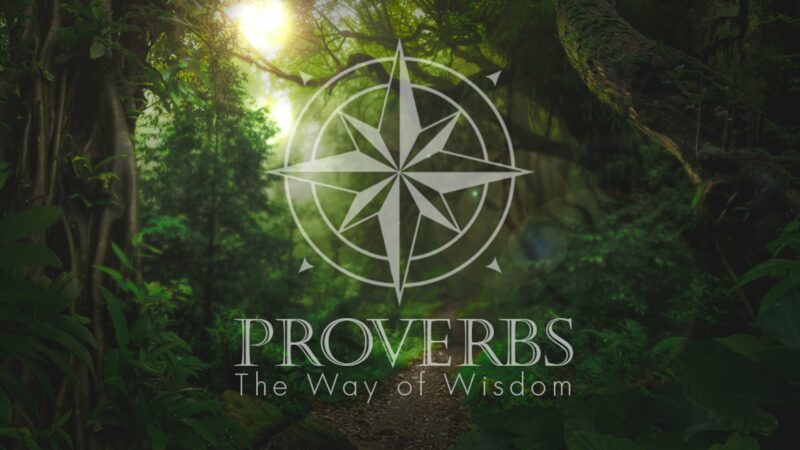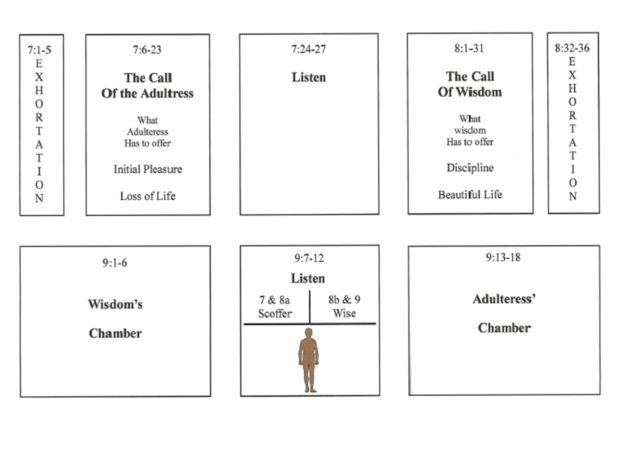
The beginning of Proverbs (Ch. 1-9) contains 10 didactic poems, featuring 10 lessons of wisdom, these are concluded with a dramatic grand finale (Ch. 7-9). In his final exhortation, the father graphically portrays Wisdom and Folly as two women, one a faithful and loving spouse, the other, an unfaithful and self-seeking adulteress. Throughout church history, these two women have been known as “Lady Wisdom” and “Dame Folly.” As you read this section, consider today that like the son, both of these women are in your life. They both call out to you and they both vie for your attention. Like the son, you too must choose who to follow.
The son must choose to which woman he will ultimately pledge his allegiance. What we will see here in chapters 7-9 is a contrast. These two women could not be more different. We will see a dichotomy involving two invitations, two ways, and two end results. His decision at this fork in the road will be destiny-shaping and life-altering. This chart is a helpful macro-level structure of this final word. (a)

Technical folks will notice this structure is “chiastic,” which just means it follows an inverted A-B-B-A format. This was a technique in Hebrew poetry used often to highlight what was in the center. In this case, the center is the father’s call to his son to “listen.”
7:1 My son, keep my words
and store up my commands within you.
2 Keep my commands and you will live;
guard my teachings as the apple of your eye.
3 Bind them on your fingers;
write them on the tablet of your heart.
4 Say to wisdom, “You are my sister,”
and to insight, “You are my relative.”
5 They will keep you from the adulterous woman,
from the wayward woman with her seductive words.
(Prov 7:1-5, NIV)
In the first 5 verses we see the father’s exhortation to his son to embrace his teachings and this will result in enjoying the good life. (“and you will live” v 2). Our culture teaches us that a life without restriction leads to happiness, but the father says true freedom is a life lived within the boundaries of the law. These are “the boundaries that free.”
The wise son should accept “Lady Wisdom” into his life, as if she were a member of his own family (“You are my sister”). This means that the son should reject the call of the “wayward woman.” Some translations call her a “strange” woman.
What does this word “strange” mean? It might better be translated as “alien.” But based on other features found in ch 1-9, this can’t be that the woman is of a different race. Instead, it’s that her behaviors are “alien” to the son’s true nature. She is not calling the son to behave the way he was designed to live.
The adulteress seeks to seduce gullible, simple, and naïve men with initial pleasures that will lead to dramatic consequences, we meet her beginning in verse 6. Here we will see the father making an elevated observation of her behavior from the second floor of a two-story house. He is peering through a wooden lattice, or a shutter, through which he can see without being seen (it would function like tinted glass).
6 At the window of my house
I looked down through the lattice.
7 I saw among the simple,
I noticed among the young men,
a youth who had no sense.
8 He was going down the street near her corner,
walking along in the direction of her house
9 at twilight, as the day was fading,
as the dark of night set in.
(Prov 7:6-9, NIV)
The young man in view does not have a firm commitment to the right way, and so he therefore puts himself in moral jeopardy. He lacks “sense.” (v 7). He is approaching her home ominously in the darkness of night, and we the readers fear that the fate of her victim will not be pleasant.
Notice in v 10, she comes out to him dressed as a harlot and wearing a veil, to mask from the public her true identity as a married woman and the wife of a wealthy merchant. To the sage, her shameless outfit betrays her hidden intentions, but to the naïve youth, it is like camouflage.
10 Then out came a woman to meet him,
dressed like a prostitute and with crafty intent.
11 (She is unruly and defiant,
her feet never stay at home;
12 now in the street, now in the squares,
at every corner she lurks.)
(Prov 7:10-12, NIV)
Next we will see her “call” which is really more of a seduction. Bruce Waltke describes Dame Folly this way: “She is a defiant, noisy, and brash huntress seeking prey on the streets of the city that leads her victims to the grave. Tragically, the gullible dimwit who refused to listen to the wise obeys her.” (b) In verse 13, it says her face is brazen, which speaks to her shamelessness about her deceptive behavior.
13 She took hold of him and kissed him
and with a brazen face she said:
14 “Today I fulfilled my vows,
and I have food from my fellowship offering at home.
(Prov 7:13-14, NIV)
Do not be deceived by her affection. Solomon tells us elsewhere that “an enemy multiplies kisses.” (Prov 27:6) Then, of all things, this woman tells the young man that she is in need of a partner for religious reasons (v 14). The “offering” referred to here was a pagan practice, perhaps a Canaanite fertility cult activity, where she would have made a vow to a foreign god and needs a male partner for sexual intercourse to fulfill that vow. As a parasite, she is just using this young man to satisfy her own desires and lusts. She does not desire to serve her creator, or her husband. She has chosen a counterfeit god as her source of security. Dame Folly uses her words to manipulate this naïve young man. In verse 15, she flatters his ego with her words, paraphrasing here, saying “I just want you, you good-looking hunk of a man!” She has prepared her bed with aphrodisiac smells.
15 So I came out to meet you;
I looked for you and have found you!
16 I have covered my bed
with colored linens from Egypt.
17 I have perfumed my bed
with myrrh, aloes and cinnamon.
18 Come, let’s drink deeply of love till morning;
let’s enjoy ourselves with love!
19 My husband is not at home;
he has gone on a long journey.
20 He took his purse filled with money
and will not be home till full moon.”
21 With persuasive words she led him astray;
she seduced him with her smooth talk.
(Prov 7:15-21, NIV)
Since she is married to another man (v 19), who is likely away traveling on business, this is a one-night stand, purely a sexual indulgence. With her lecherous words, she promises the young man safety, her husband is away and there will be no consequences, reminding the reader of the lies of the devil in the garden when he tempts Adam and Eve to sin saying, “You will not die!” (Gen 3:4). Cut from the same cloth as our original parents, the young man falls for her bait and doesn’t see the hook. Like so many adolescent boys, he acts without reflection and let his glands do his thinking for him. He has fallen for her trap.
22 All at once he followed her
like an ox going to the slaughter,
like a deer stepping into a noose
23 till an arrow pierces his liver,
like a bird darting into a snare,
little knowing it will cost him his life.
(Prov 7:22-23, NIV)
The father’s word pictures in v 22-23 are gripping and horrifying. These three stupid animals (the ox, the steer and the bird) are all deceived by the hunter. They see no connection between the traps that are set for them and their violent, unnatural deaths. The woman will conquer or “topple” him. The word “pierced” (v 23) was actually a military term for being wounded in battle. Her bedroom is in reality a warzone with carnage and dead bodies everywhere. With that said, now we are ready for the father’s strong exhortation:
24 Now then, my sons, listen to me;
pay attention to what I say.
25 Do not let your heart turn to her ways
or stray into her paths.
26 Many are the victims she has brought down;
her slain are a mighty throng.
27 Her house is a highway to the grave,
leading down to the chambers of death.
(Prov 7:24-27, NIV)
The father’s passionate exhortation is clear: Indulging with “Dame Folly” will lead to catastrophic consequences. But here is where her deception lies. There is a “gap” that exists between our choices and our consequences. We know from experience that not every foolish choice immediately results in death. In fact, sometimes it appears that there are no consequences at all. This is the trap of Dame Folly. She exploits the gap. She wants you to forget where her foolish behavior leads, and enjoy pleasure while you slip into a life of sheer mayhem. Make no mistake, joining her is a dance with death. If this is true, and it is, why would you want to even take one step toward her house?
THE LESSON
Reject Dame Folly’s seductive invitation. Do not even listen to her. Ah, yes, remember, all of this began with “listening.” This leads us to the key piece of advice, who or what are you “listening” to? The wise son will learn to “listen” to the call of “Lady Wisdom.” Her call is what follows in chapter 8.
We will examine this section next in part 2.
The Ten Lessons of Wisdom:
- Introduction
- Lesson # 1: “Reject the Enticement of Sinners” (Prov 1:8-33) – Part 1
- Lesson # 1: “Reject the Enticement of Sinners” (Prov 1:8-33) Part 2
- Lesson # 2: “Diligently Seek Wisdom … and You Will Experience Her Protective Benefits.” (Prov 2:1-22)
- Lesson # 3: “Live before God with Consistency.” (Prov 3:1-12)
- Lesson # 4: “Wisdom is a Tree of Life.” (Prov 3:13-35)
- Lesson # 5: “Your Spiritual Inheritance Comes With a Price.” (Prov 4:1-9)
- Lesson # 6: “Choose the Way of Wisdom.” (Prov 4:10-19)
- Lesson # 7: “Guard your Heart!” (Prov 4:20-27)
- Lesson # 8: “Flee from Immorality!” (Prov 5:1-23)
- Lesson # 9: “Avoid three Kinds of Fools: “The Swindler,” “The Sluggard” and “The Sociopath.”” (Prov 6:1-19)
- Lesson # 10: “If You Play With Fire, You Will Get Burned.” (Prov 6:20-35)
- Conclusion: Two Invitations from Wisdom and Folly (Prov 7:1-9:18) – Part 1
- Conclusion: Two Invitations from Wisdom and Folly (Prov 7:1-9:18) – Part 2
- Conclusion: Two Invitations from Wisdom and Folly (Prov 7:1-9:18) – Part 3
REFERENCES:
(a) I am indebted to Professor Peter Hook for this structural observation. OT Poetic Books. Course Notes. Philadelphia Biblical University, 2000.
(b) Bruce Waltke, The Book of Proverbs: Chapters 1-15 (Grand Rapids: Eerdmans, 2005), 367.




